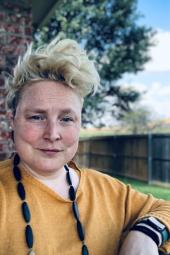Teo (Danielle) Keifert
Faculty, Educational Psychology
Assistant Professor, Learning Sciences
Matthews Hall 316

Dr. Teo Keifert is a learning scientist, researcher, educator, and assistant professor in the College of Education at the University of North Texas. Dr. Keifert studies young children's brilliance and how to cultivate that brilliance in learning. Dr. Keifert focuses on children's practices for inquiry and making. These include resources like engaging in imaginative embodiment by acting like a creature with feet on the back of your head to explore anatomy, engaging in thought experiments like imagining standing in boiling water or becoming a water particle to explore states of matter, drawing to make sense of engineering challenges, and creating cardboard representations of important moments to story life experience.
Dr. Keifert’s work examines family culture as a context for young children's inquiring and making sense of the world. Dr. Keifert’s most recent family partnerships were COVID-competent families across the U.S. to develop co-observation methodologies toward more ethically and ecologically valid forms of research with children (Learning, Being and doing in Families Study, Spencer Foundational Small Grant, PI Keifert).
Dr. Keifert broadens forms of supported sensemaking in classrooms through design-based research and professional learning partnerships. Dr. Keifert has studied how mixed-reality technologies support young children's sensemaking in science through play and embodiment (Science through Technology Enhanced Play, National Science Foundation grant, PIs Enyedy, Danish), how to support elementary teachers to design learning for all students, including multilingual learners (Representations for Teachers as Learners project, McDonnell Foundation grant), and how to design for pre-service teachers to make sense of their past learning through the lenses of expansive socio-cultural theories to (re)envision new possibilities for their future students (Equitable Science Sensemaking, National Science Foundation grant, PIs Pierson, Keifert, Jeong, Johnson, Henrie). Through this work, Dr. Keifert seeks to broaden participation in science practices not just by including more individuals in science, but also by expanding what counts as science.
Dr. Keifert earned a PhD from the Learning Sciences program at Northwestern University after five years as a middle math and science teacher and is the proud human of a rescue pup named Gracie.
- Xiao, H., Keifert, D.T., Silva, S.T.M. (accepted) Humanizing Students in a Dehumanizing Time—A Qualitative Research Exploring How Faculty Supported Students in the Pandemic. Journal of University Teaching &Learning Practice
- Xiao, H., Silva, S.T.M, Keifert, D.T. (accepted) "I Gave it All, Who Gave it to Me?" A Qualitative Study of Challenges Experienced by Faculty During the COVID-19 Pandemic. Journal of University Teaching &Learning Practice.
- Daniel, B., Pierson, A., &Keifert, D.T. (equal authorship in reverse order of seniority, 2023) Ideological sensemaking in an elementary science professional development community. Journal of the Learning Sciences. 32(4-5), 573-621 https://doi.org/10.1080/10508406.2023.2247395
- Pierson, A., Keifert, D.T., Lee, S., Henrie, A., Johnson., H., &Enyedy, N. (2023) Multiple Representations in Elementary Science: Building Shared Understanding while Leveraging Students’ Diverse Ideas and Practices, Journal of Science Teacher Education, 34(7), 707-731, https://doi.org/10.1080/1046560X.2022.2143612
- Keifert, D.T., Xiao, C., Enyedy, N., Danish, J. (2021). Learners as phenomena: Expansive inquiry as students embody water particles. Learning, Culture, and Social Interaction. 31(A). https://doi.org/10.1016/j.lcsi.2021.100572
- Keifert, D.T. (2021) Family culture as context for learning through inquiry. Cognition and Instruction. 39(3). https://doi.org/10.1080/07370008.2021.1913162
- Keifert, D.T., Lee, C., Enyedy., N., Dahn, M., Lindberg, L., &Danish, J. (2020). Tracing bodies through liminal blends during play-based inquiry in a mixed reality environment. International Journal of Science Education. 42(18). https://doi.org/10.1080/09500693.202.1851423
- Levine, S., Keifert, D.T., Marin, A., &Enyedy, N. (2020). Hybrid Argumentation in Literature and Science for K-12 Classrooms. In Nasir, N.S., Lee., C. D, Pea, R, &de Royston, M.M. (Eds.) Handbook on the Cultural Foundations of Learning (pp. 141-159). Chicago, IL: Routledge. Available: https://www.taylorfrancis.com/chapters.oa-edit/10.4324/9780203774977-10/hybrid-argumentation-literature-science-k%E2%80%9312-classrooms-sarah-levine-danielle keifert-ananda-marin-noel-enyedy
- Keifert, D.T., &Stevens, R. (2019). Inquiry as a members’ phenomenon: Young children as competent inquirers. Journal of the Learning Sciences. 28(2). https://doi.org/10.1080/10508406.2018.1528448
- Keifert, D.T., &Marin, A. (2018). A Commentary on Charles Goodwin’s Co-Operative Action for Learning Scientists. Cognition and Instruction. 36(3). https://doi.org/10.1080/07370008.2018.1460845
Education: Ph.D. 2015, Northwestern University